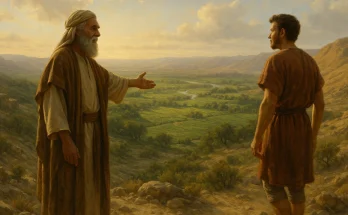Have we ever wondered how far a nation can drift before God steps in to call it back? The book of Jeremiah answers that question with powerful clarity. Jeremiah, often called the “weeping prophet,” stood boldly in one of Judah’s darkest hours. Although his message was heavy with warning, it was always filled with God’s deep longing for His people’s return.
Throughout the book of Jeremiah, we see a nation teetering on the edge of disaster. Yet, even amid rebellion, God sent His word with patience, mercy, and urgent appeal. Unlike any other prophetic book, Jeremiah’s words capture the raw struggle between divine justice and unrelenting love. His life and message remind us that God does not abandon His people easily, even when they turn away.
In this outline, we will explore the book of Jeremiah, its significance among the prophets, and how God’s call still echoes today. Together, we will see how a nation in crisis became the backdrop for one of Scripture’s most enduring pictures of hope.
Writer of the Book of Jeremiah
The book of Jeremiah was written by the prophet Jeremiah, a man called by God from a young age. He came from a priestly family in Anathoth, a small village just a few miles northeast of Jerusalem. Although he grew up with the traditions of the priesthood, God chose him for a different mission.
Jeremiah’s calling was not easy. In fact, he was reluctant at first, feeling too young and unqualified to speak for God. However, with God’s encouragement, he became one of the most faithful voices of warning and hope in all of Scripture.
Throughout the book of Jeremiah, we see his heart break for his people, even as he delivers difficult messages. His life reminds us that faithful service often means standing firm when others turn away.
Date Written
The book of Jeremiah was written during one of the most turbulent times in Judah’s history. Jeremiah’s ministry began around 627 BC, during the reign of King Josiah. It continued through the rule of several kings and ended after the fall of Jerusalem in 586 BC.
Because Jeremiah witnessed so many national crises, his writings capture decades of warnings, calls to repentance, and glimpses of hope. He recorded God’s messages over many years, often through sermons, letters, and prophetic signs.
Throughout the book of Jeremiah, we find references to historical events that help us place his ministry firmly within this critical time. Even though centuries have passed, Jeremiah’s words still speak with fresh urgency today.
To Whom Written
The book of Jeremiah was primarily written to the people of Judah and Jerusalem. God’s chosen nation had fallen into deep idolatry, injustice, and rebellion. Jeremiah’s message called them back to covenant faithfulness before it was too late. Although he spoke mainly to his own people, his words also reached surrounding nations. Throughout the book of Jeremiah, we realize that God’s heart was not just for Judah but for all who would listen. Even today, his message speaks across generations, calling us to return to the Lord.
Purpose of the Book of Jeremiah
The book of Jeremiah was written with a heavy but hopeful purpose. God’s heart was reaching out to a nation in crisis.
First, Jeremiah was sent to call Judah to repentance. The people had wandered far from God, embracing idols and injustice. Even so, God pleaded with them to turn back. Through Jeremiah’s words, we hear God’s longing to forgive, heal, and restore.
At the same time, the book of Jeremiah served as a solemn warning. If Judah continued in rebellion, destruction would come. Jeremiah clearly warned of the Babylonian invasion and the coming exile.
Although the warnings were sharp, they were never without hope. God’s goal was always restoration, not destruction. Throughout the book of Jeremiah, we also find beautiful promises of renewal. In the midst of judgment, Jeremiah spoke of a New Covenant—a deeper, lasting relationship with God.
This New Covenant would not be written on stone but on the hearts of God’s people. It would offer full forgiveness and transformation, fulfilled through Jesus Christ. Even today, the book of Jeremiah reminds us that God’s purpose is always redemption. He calls us away from ruin and into a living, vibrant relationship with Him.
Historical Context of the Book of Jeremiah
The book of Jeremiah unfolds during a time of great political upheaval. The Assyrian Empire was collapsing, and Babylon was rising to power. Judah found itself caught in the middle of these world events. King Josiah tried to bring reform, but the kings who followed led Judah deeper into rebellion.
Jeremiah lived through the final years of Judah’s existence as an independent nation. He witnessed Jerusalem’s siege, the destruction of the Temple, and the people’s exile to Babylon.
Understanding this background helps us grasp the urgency behind every message in the book of Jeremiah. God’s warnings were not empty threats—they were desperate appeals to a nation standing at the edge of ruin.
Key Themes in the Book of Jeremiah
The book of Jeremiah weaves together powerful themes that show both the seriousness of sin and the depth of God’s mercy. As we study, we see a story of brokenness and hope that still speaks to us today.
Covenant Faithfulness and Covenant Breaking
God had made a covenant with His people, but Judah repeatedly broke it. Instead of worshiping God alone, they turned to idols and injustice. Throughout the book of Jeremiah, we see God’s heartache over their unfaithfulness. Yet, we also see His deep desire to restore the broken relationship.
The Inevitability of Judgment Due to Persistent Sin
Because the people refused to repent, judgment became inevitable. God sent countless warnings, but Judah’s rebellion only grew worse. The book of Jeremiah makes it clear: ignoring God’s call brings real consequences. However, even in judgment, God never stopped loving His people.
The Call to Genuine Repentance
Jeremiah’s message was not just about punishment. Again and again, he called the people to return to God with sincere hearts. In the book of Jeremiah, repentance is not about rituals. It is about real, inner change—a full turning back to the Lord.
God’s Sovereignty Over Nations
The rise and fall of nations were not accidents of history. God was directing events according to His perfect will. Whether dealing with Judah, Babylon, or Egypt, the book of Jeremiah shows that God’s hand guided everything. No ruler was greater than God.
Promise of a New Covenant
Even in the darkest times, God promised something greater. A New Covenant was coming—one written not on tablets but on hearts. In the book of Jeremiah, this promise points forward to Jesus Christ, offering forgiveness, transformation, and eternal relationship with God.
Major Events/Stories in the Book of Jeremiah
Throughout the book of Jeremiah, we find powerful moments where God’s message breaks through the noise of a rebellious nation. These key events not only shaped Jeremiah’s ministry, but they also reveal the heart of God toward His people. Let’s walk through some of the major highlights together.
Jeremiah’s Call and Vision (Jeremiah 1)
From the very beginning, God called Jeremiah to be His prophet. Even though Jeremiah felt too young, God reassured him of divine help.
During his call, Jeremiah saw two visions: an almond branch and a boiling pot. The almond branch symbolized that God was watching over His word to perform it. The boiling pot pointed to disaster coming from the north. Both visions in the book of Jeremiah set the stage for everything Jeremiah would proclaim.
The Temple Sermon (Jeremiah 7)
One of Jeremiah’s most courageous moments was his sermon at the Temple gates. The people trusted in the temple’s presence instead of true obedience. Jeremiah warned that the building itself would not save them. God desired hearts turned toward Him, not empty rituals. In the book of Jeremiah, this sermon reminds us that true worship must always start from within.
Confronting the False Prophets (Jeremiah 28)
Not everyone liked Jeremiah’s message. False prophets, like Hananiah, preached peace and security when destruction was near. Jeremiah boldly stood against these lies. He prophesied that Hananiah would die within the year—and he did. This confrontation shows us that truth will always outlast deception. It is one of the powerful lessons woven through the book of Jeremiah.
Symbolic Acts of Jeremiah
Jeremiah often acted out God’s messages to make them unforgettable. He wore a ruined linen belt to show the nation’s corruption. Later, he bought a field at Anathoth while Jerusalem was under siege. This act symbolized hope and future restoration. Each sign in the book of Jeremiah carried deep meaning, speaking louder than words alone could.
The Fall of Jerusalem (Jeremiah 39)
Sadly, Jeremiah’s warnings went unheeded. Babylon attacked, breached Jerusalem’s walls, and destroyed the city and Temple. Jeremiah witnessed the devastation he had long predicted. His laments reveal deep sorrow, yet also unwavering faith in God’s justice. The fall recorded in the book of Jeremiah shows the heavy cost of rejecting God’s call.
The New Covenant Promise (Jeremiah 31:31–34)
Despite the darkness, Jeremiah delivered one of Scripture’s brightest promises—the New Covenant. God would write His law on hearts, not stone tablets. He would forgive sins and restore relationship. This breathtaking promise in the book of Jeremiah points directly to Jesus Christ and the new life we now have in Him.
Theological Contributions of the Book of Jeremiah
The book of Jeremiah offers some of the richest theological truths found in all of Scripture. Even today, these truths shape our faith and understanding of God.
First, Jeremiah deepens our understanding of personal responsibility for sin. No longer could the people blame their ancestors or society. God made it clear that every individual stood accountable for their own choices.
Because of this truth, we see the urgent call to genuine repentance. In the book of Jeremiah, repentance is not about outward rituals or appearances. It is a deep, inner transformation of the heart, marked by a real return to God.
Jeremiah also introduced the beautiful promise of the New Covenant. God would no longer write His laws only on tablets of stone. Instead, He would write them directly on our hearts.
This New Covenant, fulfilled through Jesus Christ, offers forgiveness, renewal, and intimate relationship with God. It stands as one of the greatest treasures of the book of Jeremiah.
Finally, we see God’s enduring faithfulness, even when judgment falls. Although Judah faced exile and devastation, God never abandoned His people. His plans always pointed toward restoration and hope.
As we walk through the book of Jeremiah, we are reminded that God’s justice is always paired with His deep, unfailing love.
Special Consideration in the Book of Jeremiah
One thing that makes this book so unique is the deep emotional connection Jeremiah had with God’s message. Often called the “weeping prophet,” Jeremiah poured out his heart in prayers and confessions. His life shows us that ministry can be lonely, costly, and heartbreaking—but still faithful.
Jeremiah also used many symbolic actions to drive home God’s truth. From burying a belt to breaking a clay jar, his life was a living sermon. We see God’s concern not just for institutions, but for the remnant—the small group who would remain faithful and carry His promises forward.
Final Thoughts on the Book of Jeremiah
The book of Jeremiah gives us a front-row seat to God’s call to a nation spiraling into crisis. Yet through every warning, we hear His deep love and enduring hope. Jeremiah’s life reminds us that faithfulness often requires courage, perseverance, and trust in God’s promises.
Today, the call to repentance, renewal, and restoration still rings true. As we walk through the book of Jeremiah, may we listen closely and respond to God’s voice with tender hearts and willing spirits.
Frequently Asked Questions (FAQ)
1. Who wrote the book of Jeremiah? The prophet Jeremiah, a priest from Anathoth, is the inspired author of the book of Jeremiah.
2. Why is Jeremiah called the “weeping prophet”? Jeremiah often wept over Judah’s rebellion and coming judgment, showing the deep compassion and sorrow he carried for God’s people.
3. What is the New Covenant in the book of Jeremiah? The New Covenant, promised in Jeremiah 31:31–34, is a heart-centered relationship with God, fulfilled through Jesus Christ.
4. What major events shaped the book of Jeremiah? Key events include Jeremiah’s call, the Temple Sermon, the fall of Jerusalem, and his symbolic prophetic actions.
5. Why is the book of Jeremiah important for us today? It reminds us that God’s call to repentance and hope is timeless. His promises are still available for every generation.



